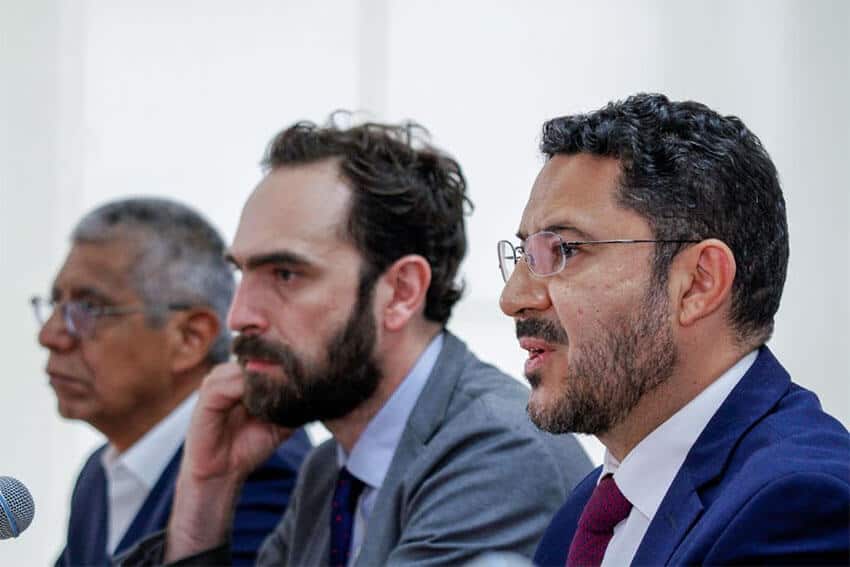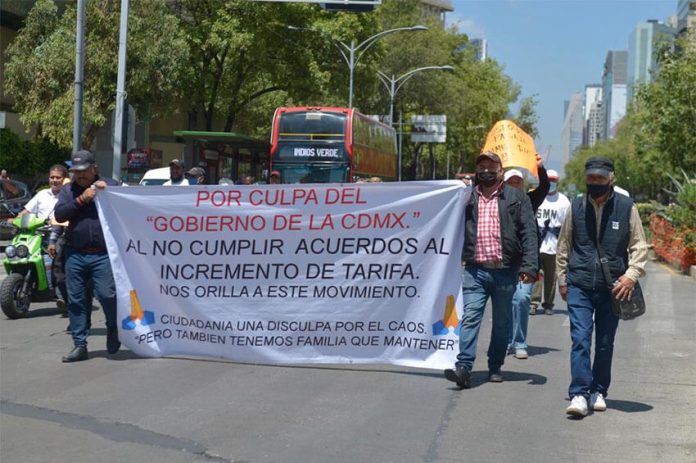Public transit operators – owners and/or drivers of buses, vans and minibuses called peseros – blocked at least 16 major roads in Mexico City Thursday to pressure the government to allow them to increase fares.
The transportistas, as the transport operators are known, are pushing for a 3-peso increase to minimum fares, which would lift them to 8 pesos (US $0.40).
Blockades began at 7 a.m. Thursday and were scheduled to continue until the afternoon but police managed to clear them sooner. Mexico City Governance Minister Martí Batres told a press conference late Thursday morning that all 16 blockades had been cleared.
“It’s worth pointing out that there were fewer blockades than expected. Secondly, the expectation was that these blockades would continue until three in the afternoon … but they were cleared before 11 a.m.,” he said.

The government had estimated that about 20% of 18,000 transportistas – who provide services that complement those offered by government-owned buses and trains – would participate in the blockades. Most of the protesters are part of a group called Fuerza Amplia de Transportistas, or FAT.
Among the roads blocked were Calzada Iganacio Zaragoza, Avenida Constituyentes, Calzada de Tláhuac and Avenida Insurgentes Norte.
The protests caused traffic chaos in the capital, and some passengers on buses that continued to operate chose to disembark and walk to the nearest subway station to continue their commute.
Transportistas say they reached an agreement with the Mexico City government in April to allow fares to be lifted, but Batres denied that was the case.
“There has been no agreement with any organization and there has been no decision from the city government” with regard to fare hikes, he said Wednesday.
Mayor Claudia Sheinbaum said in a video message Thursday that transportistas are asking for a fare increase of up to 5 pesos and that such a hike is “unacceptable.”
The transportistas, who have government permits that allow them to operate in the capital, have maintained that they are only seeking a 3-peso hike and have pointed out that fares haven’t risen for three years. But Sheinbaum argued that an increase isn’t justified.
“Our responsibility is to protect family’s finances and improve the quality of public transport. That’s why I want to tell you that since 2020, to avoid an increase in fares, we’ve been supporting the transit operators with fuel vouchers,” the mayor said.
Liberándose Calzada de Tlalpan y Division del Norte. pic.twitter.com/jip4S8XKzf
— Martí Batres (@martibatres) June 2, 2022
Sheinbaum said that between 4,000 and 6,000 pesos (about US $200 to $300) per month had been allocated to transit operators to help cover their fuel costs and that allowances have now been increased by 250 pesos.
“This represents an investment of 1.3 billion pesos [US $66.5 million] in fuel vouchers that have been given to transit operators to avoid fare increases,” she said.
The mayor also said the government has offered a range of other support measures, including loans to buy new vehicles and benefits for drivers. In exchange, she said, transport operators have been asked to do a range of things such as keeping their vehicles in good condition, having valid insurance and driving responsibly. However, they haven’t kept their side of the bargain, she said.
“It’s about putting franchised transport in order. It’s true that the [minimum bus] fare in … [Mexico City] is the lowest in the whole country. But [transit operators] have been given support like nowhere else and they haven’t put [their vehicles] in order,” Sheinbaum said.
“There is no justification for the strike, … we reject the excessive increase they’re requesting. Any demand for an increase must be associated with strict compliance of [providing] better public transport service to citizens,” she said.
The mayor said her government is open to dialogue but stressed that “there must be a commitment to improve the city’s public transport.”
Before Sheinbaum’s latest remarks, FAT representative Enrique Hernández charged that the mayor was guilty of “exercising profound political, economic and social violence against those of us who move the greatest number of people in the country’s capital.”
He pointed out that minimum bus fares are significantly higher in other parts of the country including México state, which adjoins the capital. Minimum fares in that state as well as Nuevo León capital Monterrey are 12 pesos, he said, adding that they are even higher in Saltillo (13 pesos) and Mexicali (14 pesos).
With reports from Reforma, El Financiero and El Universal
